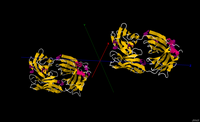
Photo from wikipedia
AIM Cetuximab is an anti-epidermal growth factor receptor antibody used for the treatment of metastatic colorectal cancer and head and neck cancer. Hypersensitivity reactions (HSRs) are associated with cetuximab use.… Click to show full abstract
AIM Cetuximab is an anti-epidermal growth factor receptor antibody used for the treatment of metastatic colorectal cancer and head and neck cancer. Hypersensitivity reactions (HSRs) are associated with cetuximab use. The aim of the study was to evaluate the utility of anti-cetuximab immunoglobulin E (IgE) detection in order to identify patients at risk of HSR to cetuximab. METHODS We included patients ready to receive a first cetuximab infusion in a prospective cohort carried out at nine French centres. Pretreatment anti-cetuximab IgE levels were measured. We compared the proportion of severe HSRs in the low anti-cetuximab IgE levels (≤29 IgE arbitrary units) subgroup with that in a historical cohort of 213 patients extracted from a previous study. RESULTS Of the 301 assessable patients (mean age: 60.9 ± 9.3 years, head-and-neck cancer: 77%), 66 patients (22%) had high anti-cetuximab IgE levels, and 247 patients received cetuximab (including 38 with high anti-cetuximab levels). Severe HSRs occurred in eight patients (five grade 3 and three grade 4). The proportion of severe HSRs was lower in the low anti-cetuximab IgE levels subgroup vs. the historical cohort (3/209 [1.4%] vs. 11/213 [5.2%], odds ratio, 0.27, 95% confidence interval, 0.07-0.97), and higher in high vs. low anti-cetuximab IgE levels subgroup (5/38 [13.2%] vs. 3/209 [1.4%]; odds ratio, 10.4, 95% confidence interval, 2.4-45.6). Patients with severe HSRs had higher anti-cetuximab IgE levels than patients without reaction (median, 45 vs. 2 IgE arbitrary units, P = 0.006). CONCLUSIONS Detection of pretreatment anti-cetuximab IgE is feasible and helpful to identify patients at risk of severe cetuximab-induced HSRs.
Journal Title: British Journal of Clinical Pharmacology
Year Published: 2017
Link to full text (if available)
Share on Social Media: Sign Up to like & get
recommendations!